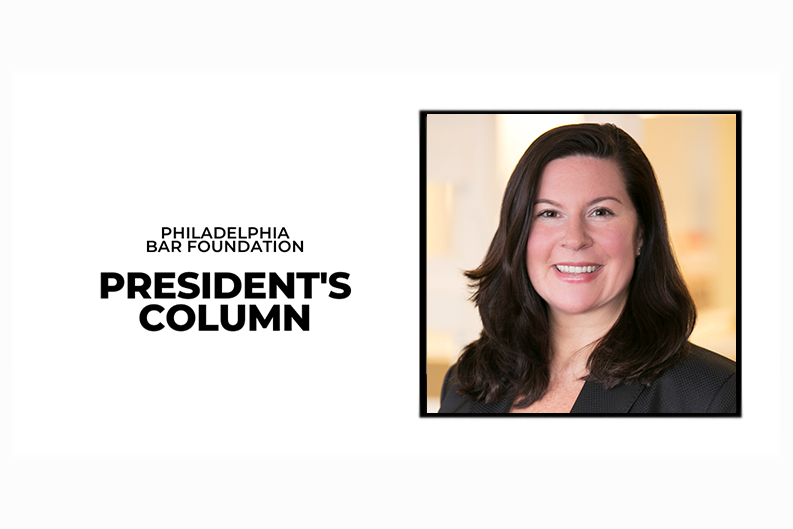Reimagining the Equal Justice Center
By Meredith S. Auten, President of the Philadelphia Bar Foundation
There have been some exciting developments with the Equal Justice Center (EJC) project in the last several months. When the Covid-19 Pandemic made proceeding with the construction of a physical building impossible, the project team met with our stakeholders and nonprofit partners and began to focus on pursuing programmatic elements of the EJC that could be implemented even in the absence of a physical location. This shift is consistent with the trend towards remote legal service delivery models that were spawned by the pandemic and have proven to be very effective.
We focused first on conducting a readiness assessment and technology review with the long-term goal of developing a centralized intake system pilot program. The Foundation engaged Novus Insight for this work. Phase 1 of this undertaking, which took place in 2021, included interviews with a core group of providers, a survey of the broader civil legal aid community, and an assessment of technology in order to fully understand the technology and data processes and challenges among our legal aid providers.
Some of the key takeaways from the Novus Report include:
- Demand for legal aid services significantly exceeds internal organizational capacity;
- The biggest challenges around intake and referrals are tied to privacy protection and system navigation;
- Improving system navigation, both between clients and providers, AND among providers, offers valuable opportunities for improving service delivery; and
- Solutions must be equitable and accessible, including adaptions across languages and different technologies.
In Phase 2, the Foundation is looking forward to working with our legal aid nonprofit partners to design a framework for system navigation, and to explore the development and use of legal aid navigators. This endeavor will involve exploring the establishment of accessibility, data sharing, and data privacy standards to which all partners would agree to adhere. At the same time, the Foundation intends to ensure that those most impacted by the inequities of the status quo, are included in the process of defining and designing these innovations. The EJC project team will engage directly with end-users in order to elevate community voices to better understand needs and barriers, and to better inform the development and implementation of community-based justice hubs or legal empowerment zones throughout the City.
Philadelphia is not alone in trying to address these challenges. Several states, including Florida, Illinois, Massachusetts, Michigan, Minnesota, and Washington, have some form of coordinated intake, triage, and/or referral systems that they have implemented to improve the delivery of legal services. According to findings from the Legal Services Corporation, 86% of the civil legal problems faced by low-income Americans in a given year receive inadequate or no legal help. As legal practitioners, we know that unrepresented litigants are far less likely to receive just outcomes. This failure to deliver on the promise of equal justice under law demands our attention and action. The EJC project team intends to learn from other jurisdictions and, in turn, to share what we discover and develop with others.
We are excited about the future of the Equal Justice Center Project. You can read the full report from Novus and learn more about the EJC on the project website.

